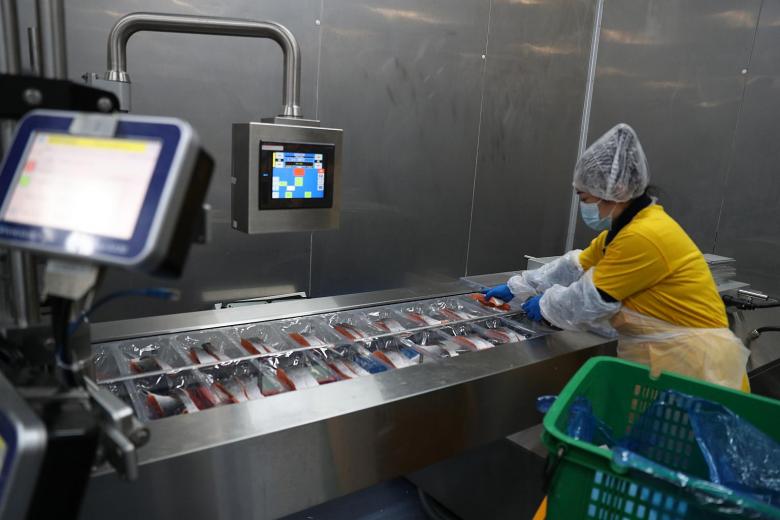
Employers in the services and manufacturing sectors will be able to hire foreign workers under work permits instead of S Passes from next year.
Currently, some employers hire manual workers on S Passes instead of work permits due to restrictions on the countries where work permit holders can be hired.
From September next year, some restrictions will be lifted and the Ministry of Manpower (MOM) will allow employers to hire these rank-and-file workers on work permits if they work in seven selected occupations.
This move is part of a broader plan to help firms adjust to the higher quality benchmark for S Pass workers, announced Minister of Manpower Tan See Leng in his speech at the 2022 Budget debate on Friday (March 4).
He was responding to Nominated MPs Cheng Hsing Yao and Janet Ang, who called for more calibrated foreign workforce policies to address persistent shortages in certain sectors in their Budget speeches.
In the Budget Statement on Feb 18, Finance Minister Lawrence Wong announced that higher minimum qualifying salaries and levies for S Pass holders would be introduced from this September, pegged to the top one-third of local associate professionals and technicians.
Said Dr Tan: “At the S Pass level, foreign workers perform specialised, technical roles. These are skilled jobs with good opportunities, which many of our polytechnic and Institute of Technical Education graduates have an interest in.
“We want to continue to ensure that our locals have a level playing field to take up these roles, and that S Pass holders are coming in to fill skills gaps, and not just because they are cheaper.”
One of the seven occupations on the list is cooks in Indian restaurants.
Dr Tan said restaurants and other businesses in the services sector can already hire work permit holders from China and Malaysia today.
With the relaxed restrictions, Indian restaurants can hire cooks on work permits without requiring them to come from China and Malaysia.
The other occupations are food processing workers, such as condiments and sauce makers in food processing firms; sheet metal workers; welders and flame cutters; metal moulders and coremakers; riggers and cable splicers; and structural metal preparers and erectors.
The new work permit policy will kick in next September, when minimum qualifying salary for S Pass renewals will see its first of three increases announced by Mr Wong.
Dr Tan said MOM will study carefully if more occupations should be added to the list, but the introduction of the list does not signal a broader liberalisation of work permit sources.
“The tripartite partners have a clear consensus on the importance of uplifting our local lower-wage workers, whom the work permit holders directly compete with. Hence, we will continue to keep the work permit sources tight to support the efforts to uplift lower-wage workers, and the ongoing moves to be more manpower-lean,” he added.
Another move to help firms adjust to the new foreign workforce policies is the new Manpower for Strategic Economic Priorities (M-SEP) scheme.
The scheme will provide firms that contribute to Singapore’s strategic economic priorities some flexibility to hire S Pass and Work Permit holders beyond the prevailing dependency ratio ceilings – or maximum ratio of foreign workers to local workers – for a limited period of time, said Dr Tan.
The scheme will be available for three years and more details will be provided in due course.
M-SEP supports firms that contribute to Singapore’s strategic economic priorities and local workforce development, and MOM is supporting the Ministry of Trade and Industry (MTI) and participating economic agencies like the Economic Development Board (EDB) to launch the scheme, said Dr Tan.
To be eligible for M-SEP, firms will have to meet MTI’s and participating economic agencies’ criteria. This includes participation in selected programmes in support of Singapore’s key economic priorities, including the EDB’s Research and Innovation Scheme for Companies and Enterprise Singapore’s Scale-Up SG.
Participating firms will also have to commit to developing their local workforce.
Dr Tan said: “Taken together, the two new schemes… will complement the changes we are making to our work pass framework, by supporting the growth of businesses that contribute to Singapore’s strategic priorities, and ultimately creating good job opportunities for locals.”
Mr Kurt Wee, president of the Association of Small and Medium Enterprises, applauded the introduction of the occupation list as it would help small and medium enterprises (SMEs) hire and retain workers.
But he added: “We certainly hope that the Government will broaden the areas (the list will apply to) to make it applicable to more services-oriented companies… I think it (the list) is very, very specific.
“If companies are unable to fulfil (the requirements for) the new category of the S Pass, at least going the work permit avenue would allow them some breathing room, particularly for micro companies.”
Work Pass | Work Permit | S Pass | Employment Pass | Dependant Pass | Long Term Visit Pass | Letter Of Consent